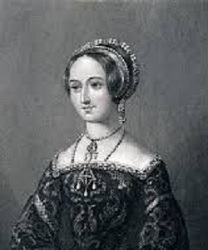Feb 22, 2026
Feb 22, 2026
 Marguerite de Navarre, by creating a space for women within the structures of authority and by placing an absolute essence (God) at its center through a rhetoric of transcendence, an appeal to absolute truth, effects a displacement of that male-dominated center of the institutions to which she and her female characters desire assimilation. That displacement coincides with a displacement of tradition (from novella to novel, from story to history) out of which a feminine écriture will emerge. This displacement does not rewrite "the rules of the game," it writes an "other game."
Marguerite de Navarre, by creating a space for women within the structures of authority and by placing an absolute essence (God) at its center through a rhetoric of transcendence, an appeal to absolute truth, effects a displacement of that male-dominated center of the institutions to which she and her female characters desire assimilation. That displacement coincides with a displacement of tradition (from novella to novel, from story to history) out of which a feminine écriture will emerge. This displacement does not rewrite "the rules of the game," it writes an "other game."
Like most Renaissance writers, Marguerite de Navarre situates herself within a tradition, the short story collection made illustrious, according to her, by Boccacio's Decameron. However, she highlights not so much the Heptaméron's morality compared with the Decameron's immorality, as some have said but rather stressing the specifically feminine genesis of the work. And Parlamente is spokeswoman for the group and often thought to be the Marguerite persona in the tales. As P.A. Chilton notes in his introduction to the Heptaméron, "These three, Oisille, Parlamente, Hircan are at the apex of a miniature aristocratic society."
Marguerite de Navarre revises Boccacio by assigning key roles to women. This work too is for the ladies, but here it is a woman whose inspiration is called upon to furnish a diversion. Parlamente suggests that a pastime be devised to prevent the company from falling ill with boredom, thus making the mother the religious authority and the vehicle for spiritual nourishment. Oisille predictably suggests that they read the Holy Scripture, whereupon Hircan, with an equally predictable "one-track mind," suggests more secular pursuits and speaks for the body. Parlamente, she who speaks her mind and speaks from the mind as well intervenes, desiring fewer private pastimes. In this manner she becomes the one who chooses how the group will occupy itself. A restructuring of the Platonic ladder of love occurs, whereby the daughter-figure, Parlamente, embodies the principle of reason meditating between fleshly and spiritual concerns.
Marguerite de Navarre, therefore, restructures the motives of storytelling as she rewrites desire. Boccacio's motive of seduction creates an erotica of storytelling. Marguerite's "different" motive of mediation, though framed in erotic terms, creates a politics of narrative history. This politics arises from the way in which she restructures the novella tradition, as a mother-daughter dialogue (Oisille-Parlamente), as a question of social mediation, or, in other terms, the integration of individual subjective values (truth) into the social order. A crucial motivating factor for Marguerite de Navarre's examination of the interrelation of desire, discourse, and history is the way in which these stories seek to situate the feminine in a narrative/historical/discursive context, the way in which they dramatize the specificity of a feminine relation to discourse and history.
Many of the stories focus on the social and political concerns, associated with marriage. Two stories constitute privileged loci for the study of Marguerite de Navarre as a female writer. Parlamente, the mediatrix, "daughter" figure, and possible Marguerite persona, recounts them both. Both stories involve female protagonists and are presented as exemplary tales containing moral lessons. Furthermore, they focus on marriage that brings into conflict the structures of authority and personal desire.
Thus, Marguerite de Navarre writes in a masculine secular tradition whose rhetoric is that of seduction and which contains no space for the female writer. Her context as a woman with a prominent and highly integrated role in society, that of wife, queen, diplomat and sister to the King of France, determines the impossibility of her remaining within such a tradition without rewriting desire, rewriting the motives of this literature of seduction. Through the rhetoric of moral and spiritual transcendence-truth-as the prologue calls it-Marguerite de Navarre creates the space in which a feminine discourse can be heard, a feminine writing can take place and enter into literary history. At the same time, within this genre a displacement occurs- the Heptaméron marks the end of the novella tradition in the style of Boccacio. Marguerite de Navarre's text mediates between women, between female writers and readers. The future of narrative bears the mark of this displacement, for the novel of the next century will be a matter not of fathers and sons but of mothers and daughters.
image courtesy wikipedia
12-Sep-2020
More by : Attreyee Roy Chowdhury

|
Excellent article |